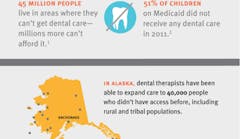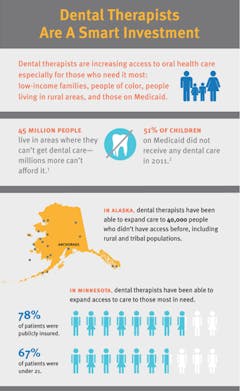Statement from David Jordan, Director of the Dental Access Project at Community Catalyst
BOSTON, May 15, 2013 /PRNewswire-USNewswire/ -- "Lack of access to dental care in the United States has reached epic proportions. Dental disease is the number one chronic illness affecting children – more common than asthma. The Institute of Medicine clearly states that the current dental delivery system doesn't work for a third of the people in the U.S.
The future of America's oral health
"The American Dental Association survey and reportconfirm the extent of the problem, but the association's recommendations for combating the problem are sorely lacking in one area: the refusal to include midlevel dental providers in the fight to expand access to quality dental care for those most in need. Midlevel providers known as dental therapists are actively expanding access to our most vulnerable citizens.
"Community Catalyst released a study just yesterday showing that dental therapists – currently practicing in Alaska and Minnesota – are rapidly expanding access to people in remote areas, those who are publicly insured, and children. Key findings from the study show that:
- Seventy-eight percent of the patients served by dental therapists in Minnesota are publicly insured;
- In Alaska, dental therapists have been able to expand access to more than 40,000 people in rural areas; and
- Nearly 85 percent of all services provided by dental therapists are routine and preventive.
Dental therapists and their critics
Dental health professional shortage areas and inadequate preventive measures to blame for nation's poor oral health
"States are struggling to provide care to children enrolled in Medicaid – 51 percent of children enrolled in Medicaid did not receive care in 2011. Yet, dental therapists are treating Medicaid patients in Minnesota and could be doing the same in other states. However, the American Dental Association has opposed this proven, common sense solution despite the evidence that these providers expand access to dental services for underserved populations.
"Solving the country's dental health access problem will require solutions on multiple fronts but adding midlevel dental providers and updating the current dental delivery system are critical. They should not be left out of the equation."
For additional information on the cost-effective care provided by dental therapists, please visit www.communitycatalyst.org or view the resources below:
Report: Economic Viability of Dental Therapists
Press Release
Infographic: Dental therapists are a smart investment






